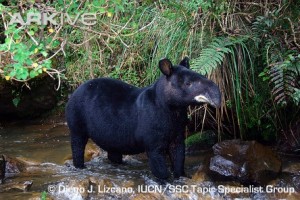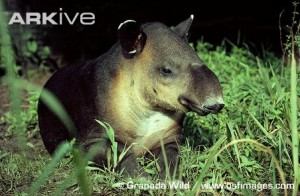World Tapir Day occurs on April 27 every year. Are you ready?
.
The following information on tapirs comes directly from the Official World Tapir Day website: http://www.tapirday.org/
.
World Tapir Day has been established, in the first instance, to raise awareness about the four species of tapir that inhabit Central and South America and South-East Asia. Each of the four species is in decline, with the Mountain Tapir (below left) facing extinction within the next twenty years, should conservation efforts not be introduced in its ever-shrinking natural range in Colombia and Ecuador. The Baird’s Tapir (below right), the largest mammal of the Americas, is facing a similar threat in its home range in Central America. Across the Pacific Ocean, the Malayan Tapir faces severe threats in Indonesia and other countries due to habitat destruction. Even the Brazilian Tapir, the most numerous species of tapir, is vulnerable because of the increasing rate of destruction of the Amazon. There may even be a fifth, distinct subspecies of Brazilian Tapir, but there is little research in this area to date.
As large herbivores, tapirs are invariably the first species affected by human encroachment into their territory, and amongst the last to return to regrowth forest. They require substantial tracts of undisturbed land to maintain a genetically-diverse population. Tapirs inhabit jungles, grasslands, swamps and cloud forests, yet each is threatened by human activity – be that mining, palm oil plantations, roads or settlements. They form an important part of the ecosystem as seed dispersers, and form one of the oldest surviving genera in the animal kingdom.
Despite their size, history and ecological importance, tapirs remain one of the least recognised species of animals. In comparison with other animals, tapirs feature little in the collective consciousness and are frequently misidentified by zoo visitors. Even in their home ranges, tapirs receive little attention, with exotic species featuring more prominently in zoos, children’s books and the media.

Mountain tapir

Baird's tapir
Photos are copyright: http://www.arkive.org
.
The plight of tapirs is symbolic for the wider threat to their habitats specifically, and the world’s ecology in general. The decline of tapir populations is indicative of the general health of their ranges; their disappearance from their home ranges often marks a point of ‘no return’ for the natural environment. The destruction of forests into small, isolated enclaves and the encroachment of human activity into pristine forests affects all native species. However, as the largest – yet perhaps the quietest – of animals in their ranges, tapirs disappear without trace with countless other species.
All tapirs are endangered species. Saving tapirs helps to save the rainforest. Saving rainforests helps to save the planet and prevent climate change.



